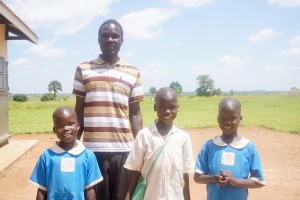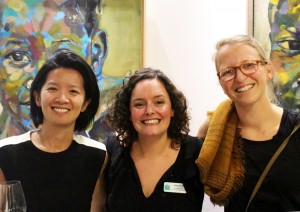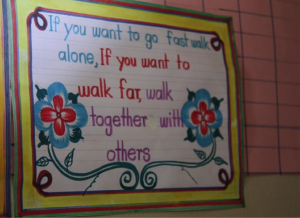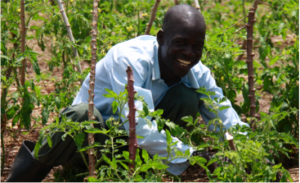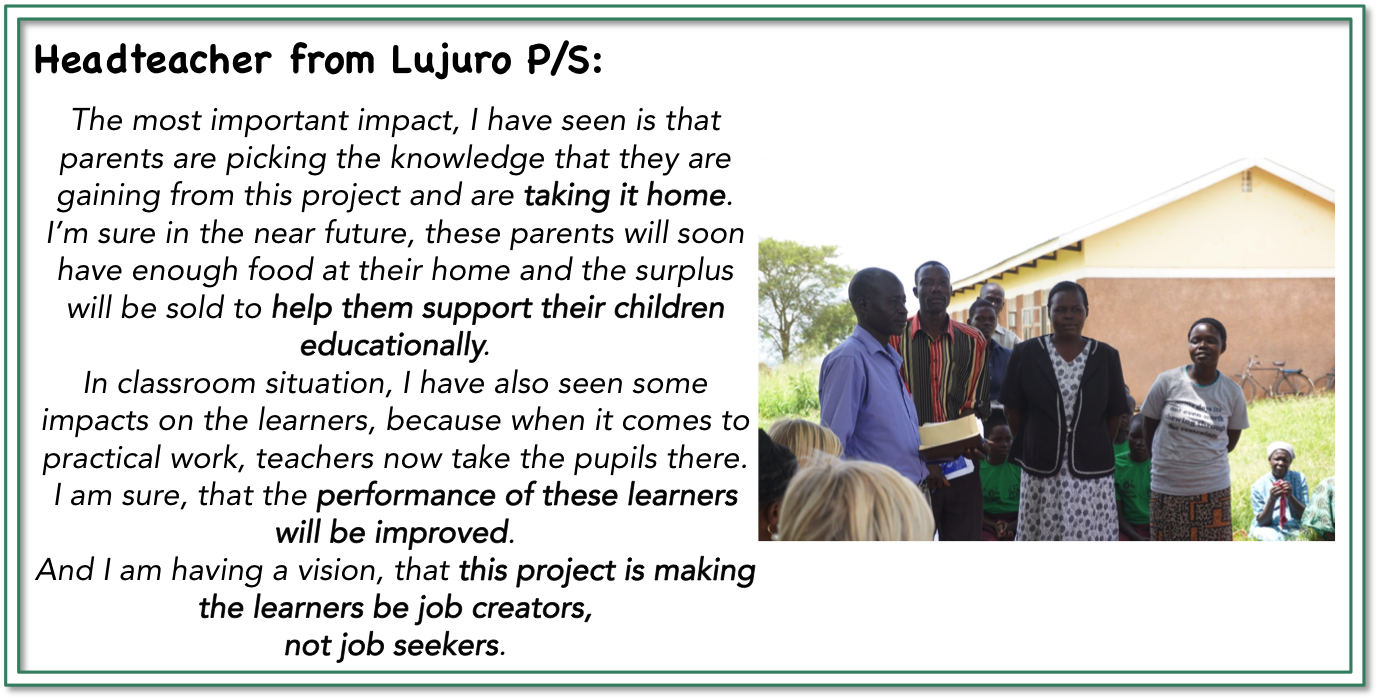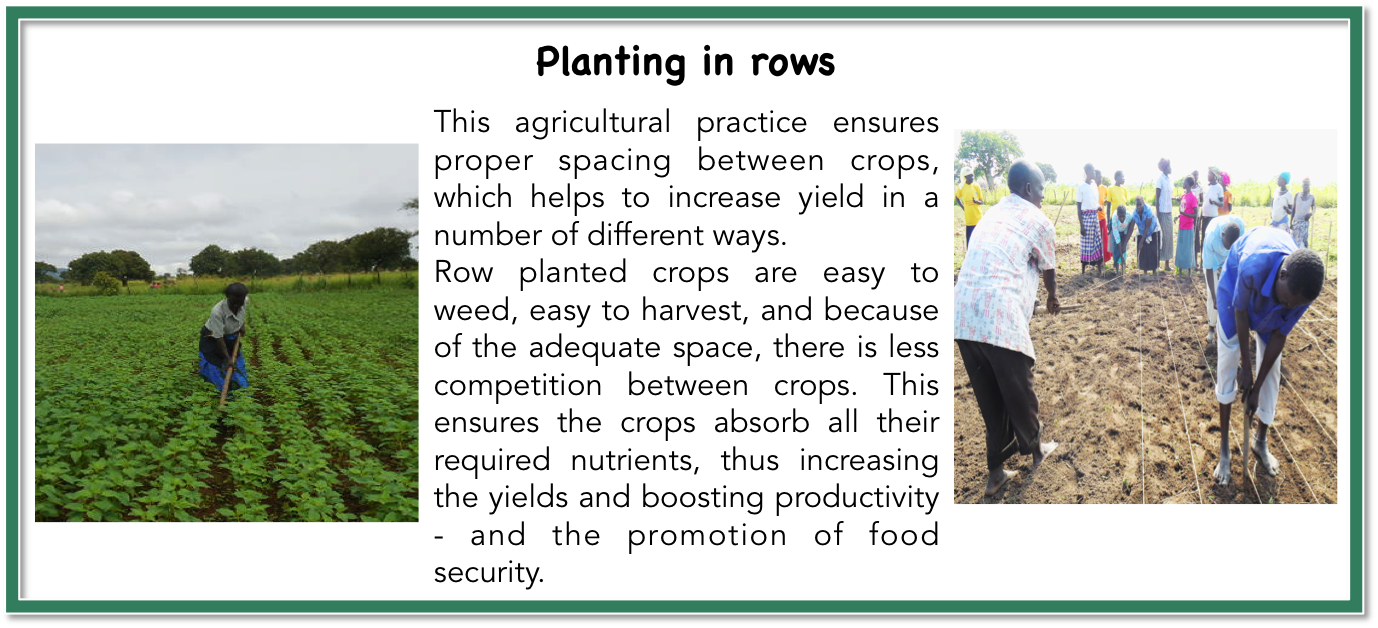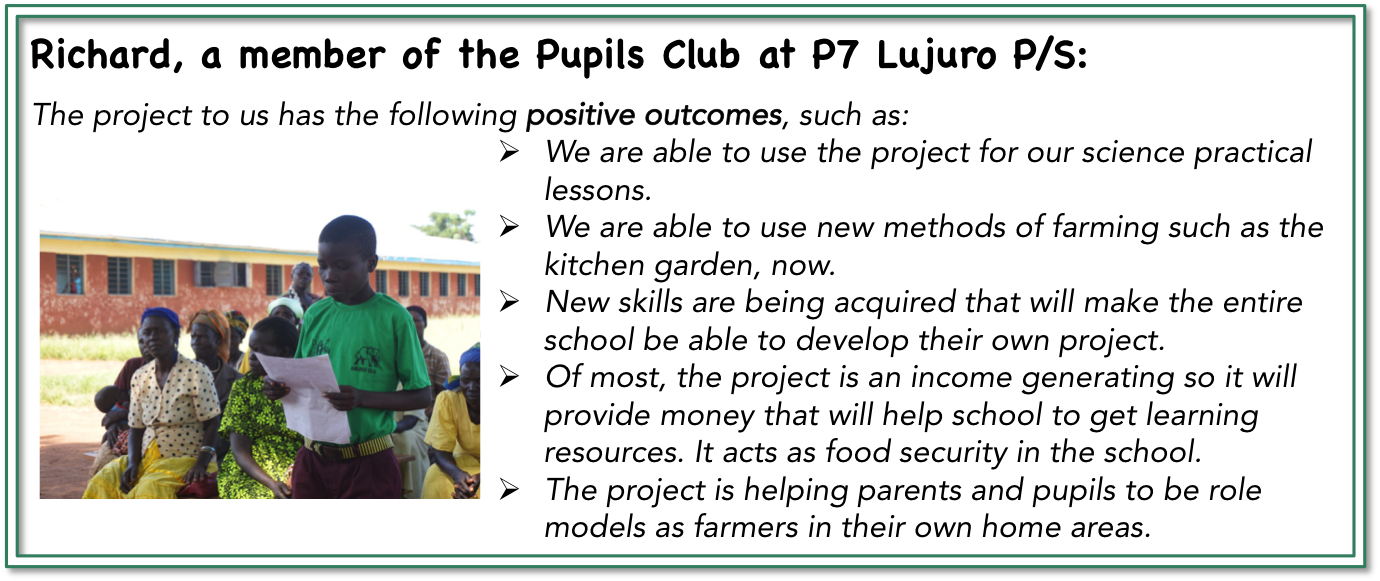African Revival-Emily Kirby Art Exhibition
November 4, 2015
We were thrilled to hold an exhibition of Zambian artist Emily Kirby’s artwork at Pioneer Underwriter’s last night. Guests were treated to a display of beautiful art, delicious canapes and stirring stories about some of the people we are currently supporting – people like the amazingly inspiring Evalyn who is responsible for 12 children, alongside doing the majority of the daily housework and also running the family farm in Amuru, northern Uganda.
Here are a couple of snaps from the evening….
Our thanks again to our hosts Pioneer Underwriters and Ian Clark, Emily Kirby herself for supplying the artwork, all those that bought paintings and our wonderful team of volunteers who made the night possible.
Posted in News | Leave a commentMeet Evalyn
November 4, 2015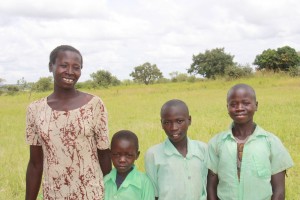 Evalyn Akklongo, aged 33, is Head of Loans in the VSLA at the Olaa Amilobo School Demonstration Garden in Oguru, Amuru District. Evalyn has eight children herself, and is responsible for the four children of her husbands’ brother – orphaned after both their parents died of AIDs-related illnesses. Evalyn’s husband is an alcoholic and, while he is never violent towards her, he does not contribute to the family income. This means that 80% of the household work is left to Evalyn, who not only cares for the children, but also tends to their farm, growing cassava and beans, and runs a small business buying and selling dried fish.
Evalyn Akklongo, aged 33, is Head of Loans in the VSLA at the Olaa Amilobo School Demonstration Garden in Oguru, Amuru District. Evalyn has eight children herself, and is responsible for the four children of her husbands’ brother – orphaned after both their parents died of AIDs-related illnesses. Evalyn’s husband is an alcoholic and, while he is never violent towards her, he does not contribute to the family income. This means that 80% of the household work is left to Evalyn, who not only cares for the children, but also tends to their farm, growing cassava and beans, and runs a small business buying and selling dried fish.
In her role in the VSLA, Evalyn distributes and keeps track of loans and communicates the information to other group members. She enjoys her role and is “very happy because I feel like the members felt I could manage the role and trusted me”.
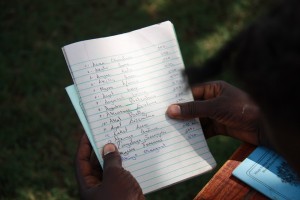 The VSLA is now where Evalyn keeps her money. She doesn’t have a formal bank account and before the scheme was introduced in August 2015, she had no proper way to save. With the VSLA, she is now able to meet more of her family’s needs. Furthermore, the VSLA group and the parents’ garden have provided Evalyn with a social support system that she lacks at home, and it’s helping to empower her as an individual; “sharing experiences with the rest of the group members is making me also quite motivated to stand on my own, ignoring what my husband is doing”.
The VSLA is now where Evalyn keeps her money. She doesn’t have a formal bank account and before the scheme was introduced in August 2015, she had no proper way to save. With the VSLA, she is now able to meet more of her family’s needs. Furthermore, the VSLA group and the parents’ garden have provided Evalyn with a social support system that she lacks at home, and it’s helping to empower her as an individual; “sharing experiences with the rest of the group members is making me also quite motivated to stand on my own, ignoring what my husband is doing”.
Evalyn has already used the loan system to boost her business. Most recently, she took a loan of 50,000 Ugandan Shillings (£9, 95kr). She brought ocra from the village community for 40,000 (£7, 76kr) and used 10,000 (£2, 19kr) for transport to Nimule (a town at the border to South Sudan where the demand for agricultural produce is higher than in Amuru district). There, she sold the ocra and made a revenue of 105,000 (£19, 200kr). She returned to Oguru, repaid the loan with five percent interest – emerging with a profit of 50,000 Ugandan Shillings (£9, 95kr)!
However, she was gone for several days and when she got home, she discovered that two of her children had been sent home from school due to unpaid tuition; so she used a portion of the profits to pay the school fees and enable her children to return to their education.
In the future Evalyn has many plans:
“I want to continue and continue saving, and also to make my savings grow so that at one point I can have a bank account in town so I can access bigger loans and grow my business and farming activities”.
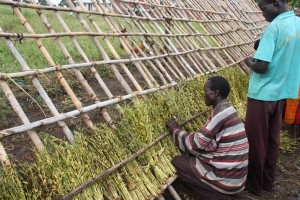 She wants to prioritise buying cattle, which would provide both a source of milk and assist in ploughing the fields, cutting down on manual labour. She would also diversify the crops she plants, with the ultimate aim of becoming a successful producer. In total, the family has 30 acres of land, much of which is currently not in use – so the potential is there for Evalyn to expand her farming activities and build a flourishing home-based enterprise. With her natural business acumen, which has been enhanced by her involvement in the VSLA, we are sure she will succeed and secure a bright future for herself and her children.
She wants to prioritise buying cattle, which would provide both a source of milk and assist in ploughing the fields, cutting down on manual labour. She would also diversify the crops she plants, with the ultimate aim of becoming a successful producer. In total, the family has 30 acres of land, much of which is currently not in use – so the potential is there for Evalyn to expand her farming activities and build a flourishing home-based enterprise. With her natural business acumen, which has been enhanced by her involvement in the VSLA, we are sure she will succeed and secure a bright future for herself and her children.
Great News from SeekTeachers!
November 3, 2015We had so me fantastic news this morning in the shape of a £1,000 donation from our corporate partner, SeekTeachers – a leading educational consultancy firm.
me fantastic news this morning in the shape of a £1,000 donation from our corporate partner, SeekTeachers – a leading educational consultancy firm.
Since we first established our relationship with SeekTeachers last year, the company has donated an amazing £2,000 to support African Revival’s work with primary and nursery schools in Uganda and Zambia. As a small but high-impact charity, we rely on this kind of fantastic support to help make sure that the children we work with have the best chance of a bright future.
Just to give you an idea of the value of this donation to our work, £1,000 could:
- Support 20 children at one of our jumpstart! nurseries
- Fund one teacher through a year’s teacher training
- Buy teaching and learning materials for one rural school run by the local community
Thank you SeekTeachers for continuing to make such a significant contribution to the lives of thousands of children in Uganda and Zambia – we’re very grateful for your ongoing support.
Posted in News | Leave a commentCanary Wharf Collection – 11th November 2015
October 29, 2015Can you help us raise funds at Canary Wharf on Wednesday 11th November?
 We found out this month that we’ve been given a slot at Canary Wharf Tube Station for a collection! This is by far the collection highlight of the year for us – last year, we raised £1,000 during one day’s collecting at Canary Wharf – and we’d absolutely love to do that again this year, but we can’t do it without you!
We found out this month that we’ve been given a slot at Canary Wharf Tube Station for a collection! This is by far the collection highlight of the year for us – last year, we raised £1,000 during one day’s collecting at Canary Wharf – and we’d absolutely love to do that again this year, but we can’t do it without you!
We are looking for passionate, motivated and enthusiastic individuals to help fill slots between 06.30 am and 10 pm on 11th November, and we’ll be there with t-shirts, buckets, tins, stickers, signs, (you name it!) so we really stand out and grab everyone’s attention.
 This is a great opportunity to be part of a fantastic and exciting community fundraising campaign contributing to vital education work. Please let us know if you or anyone you know can help – and thank you so much to everyone that has helped with our collections so far this year, you’re amazing!
This is a great opportunity to be part of a fantastic and exciting community fundraising campaign contributing to vital education work. Please let us know if you or anyone you know can help – and thank you so much to everyone that has helped with our collections so far this year, you’re amazing!
Together, we can absolutely blitz this collection and raised a huge sum to support African Revival’s work in Uganda and Zambia 🙂
Interested? Get in touch with Emily on 020 8939 3190 or send an e-mail to emily.brewster@africanrevival.org
Posted in News | Leave a commentA Gallery of Photos and Stories: Celebrating School Demonstration Gardens in Amuru District
October 21, 2015Recently, our Livelihood team was joined by Mette Müller Kristensen, a representative of the Besteller Foundation. For two days, they set out together to assess the project and hear the stories of SDG participants – but above all to celebrate the progress of our School Demonstration Gardens! Find out more with our gallery of photos, inspiring speeches, quotes and comments! Click on here to see it!
Here are a few sneak peeks:
At Lujuro Primary School, the SDG group, called Lujuro Farmer Group, took the celebration up to another level, cheering with great joy and enthusiastically performing a bunch of traditional Acholi songs and dances.
The Lujuro P/S Pupils Entrepreneurship Club prepared some traditional songs too. One of them is about teamwork, as they sing:
“We work together, and it’s easier!”
This philosophy was put into practice when pupils helped parents to transplant the onions from the nursery bed. The work was completed quicker, and the parents will show their gratitude for the pupils’ help by sharing the profits with them.
Inspired by the song, Mette, Bestseller Representative, added the African proverb:
“If you want to walk fast walk alone.
And if you want to walk far, walk together!”
And indeed, in the end, SDG is all about working together to ensure equal access to quality education, so that when the next generation walk hand in hand, they can go even further!
Posted in News | Leave a commentHappy World Food Day!
October 16, 2015‘Either we build a future for all, or there will be no acceptable future for anyone:
Let’s be the Zero Hunger Generation!’
– is one of the messages of the Food and Agriculture Organisation of the United Nations. and through our School Demonstration Garden Project, we are working towards this goal too! Currently, we implemented the project under the name LEARN in Agago and Abim in cooperation with SVN and in Amuru thanks to the support of the Bestseller Fundation. And, we have just secured a multi-years grant to implement the SDG in Zambia!
What do we do?
We set up farmer groups comprising of up to 50 parents who work at the school on the demonstration garden, attend weekly meetings and receive practical training by AR field staff. Our field staff support them in every step of the way from the preparation of the land to the marketing of their produce and finally, they also receive training in saving techniques and financial management to ensure their financial stability. After selling their produce, 30% of the harvest profits is saved for the next season, 40% is distributed among parents and the school receives 30%. Previously, these profits were then used to provide school meals, subsidise fees for poorest pupils or provide scholastic materials. Furthermore, pupils entrepreneurship clubs are formed too, in order to ensure the next generation are acquiring valuable skills.
Why?
Agriculture continues to play a critical role – i.e. in the Ugandan economy, employing 82% of the national workforce. Low yields and inefficient agricultural practices leave households vulnerable. As a result, children also often go hungry while at school, a major factor as to why Uganda has the highest school dropout rate in East Africa. Additionally, this affects concentration levels and learning retention. Therefore, this project ties education and livelihoods together, and is one of African Revival’s core areas of expertise as our intervention seeks to address two interlinked issues – low quality education at a primary level and food insecurity compounded by poor agricultural productivity. We aim to create stronger links between parents and schools leading to increased enrolment, attendance and academic attainment, and children are also learning practical agricultural skills. Parents and pupils increase agricultural productivity both at the school garden and home gardens, both increasing food security and nutrition. In the end, we want to empower these communities to lift themselves out of poverty!
To celebrate the World Food Day we’ve prepared a few of our recent gathered reflections of our beneficiaries, some photos of the new agricultural techniques implemented in the school and some ‘do it yourself’ tips for all growers out there from our agriculture team.
As we aim to strengthen a strong sense of community throughout the project, parents, pupils and teachers are working hand in hand to secure a hunger-free future in which every child is nourished well, and able to thrive in his/her education/at school.
Happy World Food Day!
Posted in News | Leave a commentTeacher Profile: Sajida Mweemba
September 28, 2015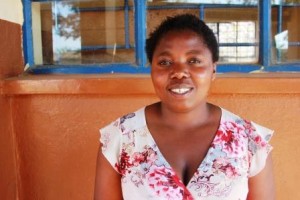 Meet Sajida Mweemba, a 26 year old teacher from Kinnertone Community School. Sajida is from the town of Kalomo, southern Zambia, but during the week, she lives in her school’s office in Kinnertone with her son, 8 year-old Colin, and daughter Maluba, who is six. After long weeks at school, Sajida enjoys coming home to Kalomo to spend weekends with her husband.
Meet Sajida Mweemba, a 26 year old teacher from Kinnertone Community School. Sajida is from the town of Kalomo, southern Zambia, but during the week, she lives in her school’s office in Kinnertone with her son, 8 year-old Colin, and daughter Maluba, who is six. After long weeks at school, Sajida enjoys coming home to Kalomo to spend weekends with her husband.
Sajida began her teaching career as soon as she finished Grade 12 at school; she obtained such good school results that upon graduation four years ago, she was offered a teaching post at a private school. After two years of teaching in the private sector, Sajida was determined to obtain a formal teaching qualification. She was accepted onto a teaching course, but was only able to pay for one term at the college before running out of funds to support herself, and was sadly forced to drop out. Without a teaching certificate, Sajida was unable to become a government teacher, but her local district education authorities saw her potential and placed her at a community school instead – Kinnertone Community School, where she has now been working since 2013.
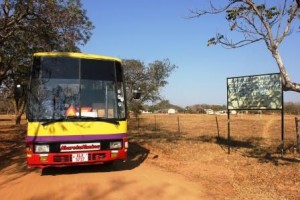 In a stroke of serendipitous timing, at that time, African Revival was looking to support bright, untrained community teachers through teacher training, and we happened to meet Sajida…fast forward 18 months, and Sajida has almost finished her teaching course at Charles Lwenga Teacher Training College! Sajida enjoys her job and firmly believes in the value of education: “I like to be a teacher because I like seeing children learn, and I also enjoy being with my students. Education is important because it changes the behaviour of the people in the community. You find that in the community there are people who [are] educated, and it is good for them to mix with those who aren’t educated, because you can develop and teach one another.”
In a stroke of serendipitous timing, at that time, African Revival was looking to support bright, untrained community teachers through teacher training, and we happened to meet Sajida…fast forward 18 months, and Sajida has almost finished her teaching course at Charles Lwenga Teacher Training College! Sajida enjoys her job and firmly believes in the value of education: “I like to be a teacher because I like seeing children learn, and I also enjoy being with my students. Education is important because it changes the behaviour of the people in the community. You find that in the community there are people who [are] educated, and it is good for them to mix with those who aren’t educated, because you can develop and teach one another.”
Sajida currently teaches Grade 3, and she tells us that her 18 pupils are doing very well: “my class are doing very fine; they are children who like reading”. In fact, Sajida has high hopes for her enthusiastic readers: “I will be happy if I can see that the children I have taught are developing the country, like if they are becoming the teachers, nurses, and other valuable jobs.” It looks like Sajida’s dreams for her pupils could well come true as she told us that her pupils aspire to follow in her footsteps: “there are some children who like to be with me – they even imitate how I talk and say things like “I want to be a teacher like you, Madame!”.
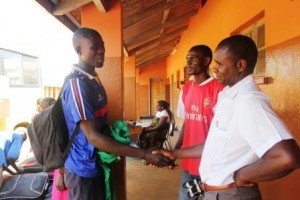 It is heart-warming moments like these which keep Sajida motivated, as being a community teacher can be very difficult: “At community schools, you find that they don’t support you financially. But we try by all means. Sometimes, it can be difficult trying to get parents to come to school so that we can talk together about how to best support their child, and help with any difficulties they have. But sometimes don’t come to meetings to help us solve these problems. Also, it is sad because sometimes children stay absent from school for a long time.” Although these obstacles can be difficult to overcome, through her training, Sajida is learning how to effectively communicate with parents, so that they can work together for the good for the children.
It is heart-warming moments like these which keep Sajida motivated, as being a community teacher can be very difficult: “At community schools, you find that they don’t support you financially. But we try by all means. Sometimes, it can be difficult trying to get parents to come to school so that we can talk together about how to best support their child, and help with any difficulties they have. But sometimes don’t come to meetings to help us solve these problems. Also, it is sad because sometimes children stay absent from school for a long time.” Although these obstacles can be difficult to overcome, through her training, Sajida is learning how to effectively communicate with parents, so that they can work together for the good for the children.
Sajida has been excelling in her teacher training so far: “I have enjoyed this training because from the time I started teaching, I had that hope that I would complete the course without failing, and I am happy because when we sat exams a few months ago, I passed and I am still here and I know that I will pass.” We are delighted to have been able to offer Sajida the opportunity to obtain a formal teaching qualification, and we are sure she is going to smash her final exams in a few months time!
Posted in News | Leave a commentTeacher Profile: Chitambo Elizabeth
September 21, 2015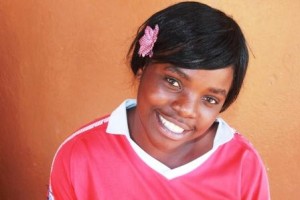 Chitambo Elizabeth is a 22 year-old teacher who currently works at Cjikoli Basic School, 4km away from Kalomo town, where our Zambian office is based in the country’s southern province. She lives in Kalomo with her husband, and her baby son, Luck.
Chitambo Elizabeth is a 22 year-old teacher who currently works at Cjikoli Basic School, 4km away from Kalomo town, where our Zambian office is based in the country’s southern province. She lives in Kalomo with her husband, and her baby son, Luck.
Elizabeth knew from a young age that she was destined to become a teacher: “from the time I was born, I have called myself a teacher because even when I was very little, I was always teaching others, and so when I grew up, I thought I could teach a class. You could say that I have always wanted to be a teacher!” Fortunately for Elizabeth, once she finished high school two years ago, the community caught wind of her love for teaching and her natural ability to teach others, and was immediately snapped up by Cjikoli Basic School, despite not holding a teaching qualification.
Elizabeth absolutely loves her job, and told us: “when you are a teacher, you find out a lot of things and learn lots of things because when you are teaching, as you are interacting with pupils, you learn from them and they learn from you also. I am always learning. I am someone who is discovering new things every day.”
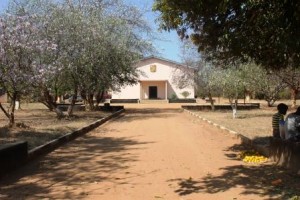 Elizabeth is currently teaching 32 pupils (16 boys and 16 girls) in Grade 4: “I like my class very much, and 22 of my pupils can read and write so we are making good progress!” Elizabeth is determined that with lots of hard work, all her pupils will soon be able to read and write! As such, she is committed to ensuring that her students get the best start in life, so that they can enjoy a happy future: “I would like to see all my pupils have a good life, so that they can have everything they need. I don’t want to see them have a life of begging, or suffering. No. I want to see them have their own things. I am teaching them to be independent so when they grow up, they can do things on their own.”
Elizabeth is currently teaching 32 pupils (16 boys and 16 girls) in Grade 4: “I like my class very much, and 22 of my pupils can read and write so we are making good progress!” Elizabeth is determined that with lots of hard work, all her pupils will soon be able to read and write! As such, she is committed to ensuring that her students get the best start in life, so that they can enjoy a happy future: “I would like to see all my pupils have a good life, so that they can have everything they need. I don’t want to see them have a life of begging, or suffering. No. I want to see them have their own things. I am teaching them to be independent so when they grow up, they can do things on their own.”
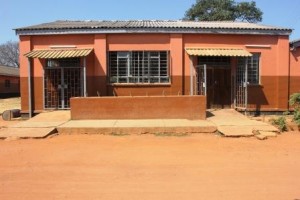 A keen learner, Elizabeth jumped at the opportunity to study for her teaching certificate at Charles Lwenga College. Ever the teacher, Elizabeth tells us that she has even been sharing all her new-found knowledge with her colleagues, and helping them to grasp the teaching concepts which she has been learning. She has now been studying for 18 months, and has enjoyed the experience so far: “it has been a good training; I have learnt a lot of things. Before, I wasn’t trained, but now I know what a teacher does, what I am supposed to do, what I am supposed to teach and how to handle the community.”
A keen learner, Elizabeth jumped at the opportunity to study for her teaching certificate at Charles Lwenga College. Ever the teacher, Elizabeth tells us that she has even been sharing all her new-found knowledge with her colleagues, and helping them to grasp the teaching concepts which she has been learning. She has now been studying for 18 months, and has enjoyed the experience so far: “it has been a good training; I have learnt a lot of things. Before, I wasn’t trained, but now I know what a teacher does, what I am supposed to do, what I am supposed to teach and how to handle the community.”
Indeed, working at a community school presents its challenges. Elizabeth told us:“Since I am at the school, I have not been paid. I am married so my husband supports me, but for community teachers with no families, it is very hard. It can be discouraging because you work hard and at the end of the day, you get nothing because parents don’t have enough money to pay school fees which pay our salaries.”
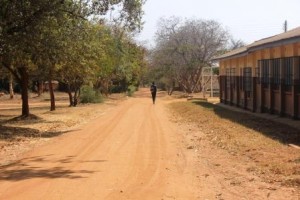 We have been so pleased to sponsor Elizabeth through her studies, so that she can hone her natural abilities, and improve her teaching even further. Once Elizabeth gains her recognized teaching qualification, she will be able to be paid by the government which means that she will be fairly compensated for all her hard work! Elizabeth is very happy about this good news and told us: “Thanks, we are so grateful for your help; thank you for sponsoring us – without you we wouldn’t be here and without you, we would not have acquired the knowledge which we have gained here! We are now better teachers because of you!”
We have been so pleased to sponsor Elizabeth through her studies, so that she can hone her natural abilities, and improve her teaching even further. Once Elizabeth gains her recognized teaching qualification, she will be able to be paid by the government which means that she will be fairly compensated for all her hard work! Elizabeth is very happy about this good news and told us: “Thanks, we are so grateful for your help; thank you for sponsoring us – without you we wouldn’t be here and without you, we would not have acquired the knowledge which we have gained here! We are now better teachers because of you!”
Elizabeth has been so thankful for our support but the truth is, it’s been our absolute pleasure, and we cannot wait to watch Elizabeth qualify as a fully certified teacher in December 2015!
Posted in News | Leave a commentNews from our Jumpstart! Programme: ECD Centres are mapping their future!
September 18, 2015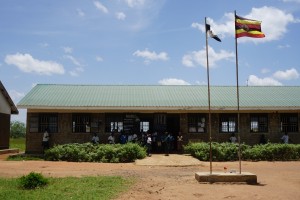 Our Education Jumpstart! team is currently busy conducting Centre Development
Our Education Jumpstart! team is currently busy conducting Centre Development
Plan workshops, in which CMC (Centre Management Committee) members, PTA
(Parents-Teacher-Association) members, SMC (School Management Committees) members and caregivers are trained in developing a Centre Development Plan (CDP) for
their ECD centre. Last week, a two-days workshop was held at St Kizito Bidati Nursery School. With all parties attending, there were 10 enthusiastic and willing ‘learners’, eager to develop a 3-year-plan with one main goal: Quality Education!
The workshop followed three clearly defined objectives:
- Understand planning in the context of Centre Development Plan
- Identify areas that can be considered in that plan
- Understand the steps involved in the development plan
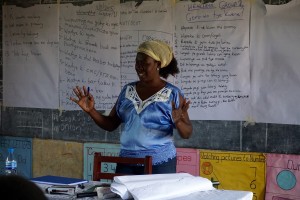 The key word for these workshops is empowerment: We help and guide them through the process of developing their Centre Management Plan by giving them incentives, asking questions and providing some constructive assistance when needed – but it is our participants that come up with concrete ideas which will then translate into their own, individual, customised Centre Development Plan! Right from the start, it is especially important to our Education Programme Coordinator Richard for everyone to realise how quality education can be achieved:
The key word for these workshops is empowerment: We help and guide them through the process of developing their Centre Management Plan by giving them incentives, asking questions and providing some constructive assistance when needed – but it is our participants that come up with concrete ideas which will then translate into their own, individual, customised Centre Development Plan! Right from the start, it is especially important to our Education Programme Coordinator Richard for everyone to realise how quality education can be achieved:
“A lot of school development plans focus on improving infrastructure. However, that doesn’t always have to translate into quality education! Teachers, for example, are much more essential – whatever you invest in their training and development will provide quality education!”
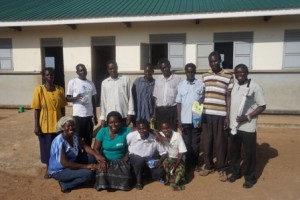 The participants at St Kizito Bidati quickly understood that quality education can only be achieved through a multifaceted approach. This is why, on DAY I, they identified four key areas which their CDP shall focus on: First of all, special emphasis shall be put on (1) ‘Curriculum delivery’ – This means it’s all about the teachers, their training, refresher workshops and adequate materials, but also their motivation from the parents. Here, Julius, a CMC member, stresses
The participants at St Kizito Bidati quickly understood that quality education can only be achieved through a multifaceted approach. This is why, on DAY I, they identified four key areas which their CDP shall focus on: First of all, special emphasis shall be put on (1) ‘Curriculum delivery’ – This means it’s all about the teachers, their training, refresher workshops and adequate materials, but also their motivation from the parents. Here, Julius, a CMC member, stresses
“If you motivate the teachers, they will love your children more. If you care about this, about the teachers, they will have a set mind, they will care about a only your children, not worry about anything else.”
 The second key area is (2) ‘Child-friendly learning environment’. The main focus will be ‘Creating a talking classroom’. This will involve investing in resources, so that at the end of the day, the classrooms are talking for themselves. However, an eye shall also be put on improving outside playing materials and providing enough shade for the children to play outside. Additionally, ensuring a clean and safe environment as well as a clean water source are also part and parcel of this key area. Thirdly, ‘school infrastructure’ (3) shall be improved through, for example, the construction of a bathing facility. Last but not least, boosting (4) ‘parental involvement’ is the fourth key area identified. They are aiming at sensitising parents on the value of ECD through events such as Parents Open Days. Additionally, they came up with another great idea to raise awareness about the importance of ECD: In Uganda, elections are coming up next May and local leaders have already been busy campaigning; the people from Bidati will try to convince some of these local leaders to include ECD in their manifestos! Parental involvement is a key issue for a sustainable change at every school, and at St Kitizito Bidati. This was also evident when looking at development partners and stakeholders. In this respect, as much as the support by NGOs is extremely valuable in these communities, it is decisive to look at them as an additional source of funding that can contribute to areas where parents lack sufficient funding.
The second key area is (2) ‘Child-friendly learning environment’. The main focus will be ‘Creating a talking classroom’. This will involve investing in resources, so that at the end of the day, the classrooms are talking for themselves. However, an eye shall also be put on improving outside playing materials and providing enough shade for the children to play outside. Additionally, ensuring a clean and safe environment as well as a clean water source are also part and parcel of this key area. Thirdly, ‘school infrastructure’ (3) shall be improved through, for example, the construction of a bathing facility. Last but not least, boosting (4) ‘parental involvement’ is the fourth key area identified. They are aiming at sensitising parents on the value of ECD through events such as Parents Open Days. Additionally, they came up with another great idea to raise awareness about the importance of ECD: In Uganda, elections are coming up next May and local leaders have already been busy campaigning; the people from Bidati will try to convince some of these local leaders to include ECD in their manifestos! Parental involvement is a key issue for a sustainable change at every school, and at St Kitizito Bidati. This was also evident when looking at development partners and stakeholders. In this respect, as much as the support by NGOs is extremely valuable in these communities, it is decisive to look at them as an additional source of funding that can contribute to areas where parents lack sufficient funding.
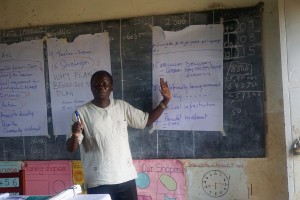 On DAY II, they were ready to get into the details and started off with a SWOT/SCOT (Strengths, Weaknesses/Challenges, Opportunities, Threats) analysis of their school. This is done for specific purpose:
On DAY II, they were ready to get into the details and started off with a SWOT/SCOT (Strengths, Weaknesses/Challenges, Opportunities, Threats) analysis of their school. This is done for specific purpose:
“We want them to see everything in order to make them aware of what is going on how they can use their opportunities to erase their weakness & strengths.”(Richard)
As the ECD centre is only in its nascent stage, it is faced with several challenges andweaknesses, ranging from a lack of classroom, bathing facilities, shades and playing and learning material to high rates of absenteeism in rainy and harvest seasons and rather low 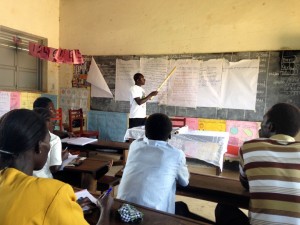 parental involvement. And poverty continues to plague the communities in the region, ultimately representing a threat to the mere maintenance of the nursery. However, they hope to tackle these issues by drawing on their strengths, such as dedicated and qualified teachers, committed CMC members, good enrolment and valuable support of the primary section, and exploiting their ‘opportunities’, may it be through cultivating bare school land for meals for the children or bringing more parents as well as children on board through greater community sensitisation.
parental involvement. And poverty continues to plague the communities in the region, ultimately representing a threat to the mere maintenance of the nursery. However, they hope to tackle these issues by drawing on their strengths, such as dedicated and qualified teachers, committed CMC members, good enrolment and valuable support of the primary section, and exploiting their ‘opportunities’, may it be through cultivating bare school land for meals for the children or bringing more parents as well as children on board through greater community sensitisation.
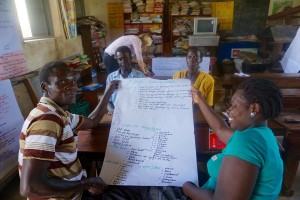 Before everyone was off for the weekend, they started to get to the details, having a look at what resources and expenses will be necessary in order to implement their CDP. Participants were split up into groups. Coincidentally, their results perfectly complemented each other: While the first focused much more on the construction aspect of the SDP, the second prioritised on resources needed inside the classrooms. And once again, they agree on the importance of investing in teacher training. Additionally, their realistic mind-set and awareness of their limited resources inspires them to think practically. For example, when it comes to their constructions plans, they also consider local grass-thatched houses as an alternative.
Before everyone was off for the weekend, they started to get to the details, having a look at what resources and expenses will be necessary in order to implement their CDP. Participants were split up into groups. Coincidentally, their results perfectly complemented each other: While the first focused much more on the construction aspect of the SDP, the second prioritised on resources needed inside the classrooms. And once again, they agree on the importance of investing in teacher training. Additionally, their realistic mind-set and awareness of their limited resources inspires them to think practically. For example, when it comes to their constructions plans, they also consider local grass-thatched houses as an alternative.
The common goal of everyone involved inspires great teamwork and contribution – when Denis, one of the caregivers, addresses the issue of the provision of midday meal by parents, he makes quite a bold move, saying:
“Sometimes you give your children a meal, but you forget about the teachers.”
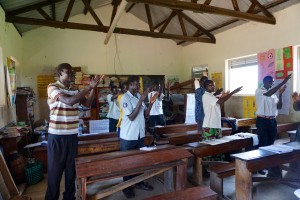 – But the cheekiness is met with great generosity by the attending parents, as they offer to supply the teachers with some land as well as support in the preparation of the land. Filled with motivating appreciation claps for their work, the two-days workshop at St Kizito Bidati ECD centre passed quickly and they look forward to the next workshop, eager to set their CMP into stone.
– But the cheekiness is met with great generosity by the attending parents, as they offer to supply the teachers with some land as well as support in the preparation of the land. Filled with motivating appreciation claps for their work, the two-days workshop at St Kizito Bidati ECD centre passed quickly and they look forward to the next workshop, eager to set their CMP into stone.
From the perspectives of the ‘Juliuses’
Following the workshop, we had the opportunity to talk to a PTA and CMC member who are both called Julius. Find out more about them in the following paragraphs!
Julius #1 – PTA member
We had the opportunity to chat to Julius, a farmer and PTA member at St Kizito Bidati. Four of his five children have already left primary school, but Moses, his youngest, remains and additionally, two of his grandsons, Patience and Emmanuel, from his oldest son, Walter, are currently in K3. Last year, Julius was selected as a PTA member by the community – a position that he has appreciated so far:
“I like it, because I am part of the school, it makes me part of the school. I know how learning is taken place; and above all, my child are also here.”
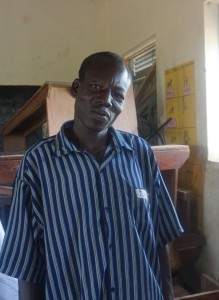 Here is an extract of our feedback-chat:
Here is an extract of our feedback-chat:
What do you think about the performance of the school ?
The school is doing well, but there are certain things that need to be improved on – mostly the parents, who are not doing their part. What do you think of ECD? I am very positive about the ECD, because that is the foundation, for this school to succeed, although there are still challenges with them; there are a few things to be done with the ECD to have that quality.
What do you think of the Jumpstart! project?
For me, the Jumpstart! project is really good, it’s coming to complement what parents are trying to do.
What is best about it?
What I like most about this is the caregivers training, and refresher coursers, the way that teachers are being developed in their skills and are improving each time, because the teachers have demonstrated what they were like before and what they are now. And we, as the management, we were very happy about that. And I think, the impact will go to the children.
What do you think of the workshop?
This workshop is very good. And it wasn’t there before. No one was thinking about it. I now understand the planning – it gives people the opportunity to know what they are supposed to be doing. And I was interested to know more of the different roles of the stakeholders. And I was requesting that such support, if possible, should continue to the leadership of the school, to the management, because it would help them do their work well.
What’s the most important part for you to implement in the CDP?
For me, curriculum delivery is the most important, as well as supporting the teachers, their training and providing the learning materials.
What do you hope for the school?
My hope for this school is to have more caregivers; at least two per class, and this will improve the quality of teaching.
Julius #2 – CMC member
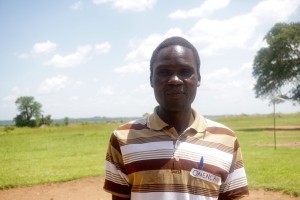 Meet Julius, a 36 year-old farmer from Bidati village in Nyowa district, father of Jacob, Prosie and Fiona, and dedicated member of St.Kitizo Bidati School Central Management Committee ! He was one of the attendees at the two-day Jumpstart! training workshop about developing a Centre Development Plan.
Meet Julius, a 36 year-old farmer from Bidati village in Nyowa district, father of Jacob, Prosie and Fiona, and dedicated member of St.Kitizo Bidati School Central Management Committee ! He was one of the attendees at the two-day Jumpstart! training workshop about developing a Centre Development Plan.
The most important thing that Julius learnt at the training is the importance of planning:
“before the training, the committee was motivated, but not so organised because there was no plan. Now we know who should do what at which time because in the plan everything is detailed – timeframe, goals, responsables, activities. And we are not stopping here – we will meet with other parents to communicate this knowledge.”
Learning how to create action plans has formalised the way the committee works, making them more efficient and productive. Julius is positive that with these new skills, the committee can encourage parents to unite to support the progress of the school.
In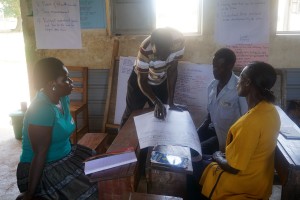 deed, Julius wants to form a committee plan that will raise the standard of education at nursery level, ultimately increasing the quality of teaching and learning and contributing to early childhood development. His belief in the importance of nursery education is based on his own experience as a parent. While his two daughters attended nursery school, his son Jacob did not. The two girls excel at school (Fiona is 1st in her class), often receiving certificates praising their academic performance and organisational skills. However Jacob struggles at school, and has little interest in completing his homework. Julius attributes the educational success of his daughters to their nursery education, which he says helped them to build basic skills and confidence before entering primary level.
deed, Julius wants to form a committee plan that will raise the standard of education at nursery level, ultimately increasing the quality of teaching and learning and contributing to early childhood development. His belief in the importance of nursery education is based on his own experience as a parent. While his two daughters attended nursery school, his son Jacob did not. The two girls excel at school (Fiona is 1st in her class), often receiving certificates praising their academic performance and organisational skills. However Jacob struggles at school, and has little interest in completing his homework. Julius attributes the educational success of his daughters to their nursery education, which he says helped them to build basic skills and confidence before entering primary level.
However, we think that Julius’s dedication to his children’s education has also contributed to this success. He keeps a close eye on his children’s progress both at school and at home, attending ‘lesson day’ each term, a time for parents to attend classes with their children, observe the work scheme and discuss the curriculem with the teachers. Julius regrets leaving school at a young age, so he really values lesson day;
‘I always want to attend, rather than my wife, and sometimes I ask to be set assignments with the children !”
Now that’s dedication ! In the future, he hopes that his children will study hard, but above all “be self-respecting individuals, with careers of their own, who value their jobs”. And he will also do his best to improve the quality of nursery education at Kizito Bidati so that all the students can grow as individuals and have successful careers.
